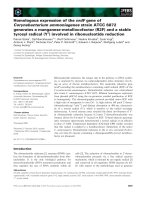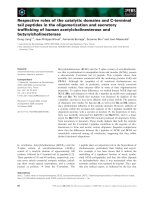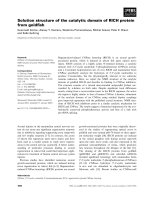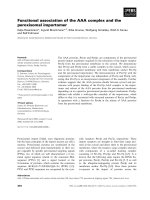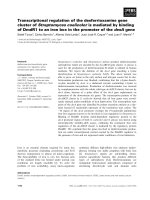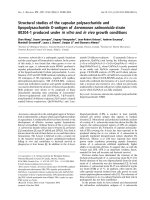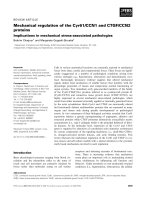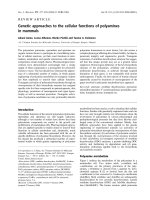Báo cáo khoa hoc:" Genetic variation in the myeloperoxidase gene and cognitive impairment in Multiple Sclerosis" pot
Bạn đang xem bản rút gọn của tài liệu. Xem và tải ngay bản đầy đủ của tài liệu tại đây (197.92 KB, 3 trang )
BioMed Central
Page 1 of 3
(page number not for citation purposes)
Journal of Negative Results in
BioMedicine
Open Access
Brief report
Genetic variation in the myeloperoxidase gene and cognitive
impairment in Multiple Sclerosis
I Manna
1
, P Valentino
2
, A La Russa
1
, F Condino
1
, R Nisticò
2
, M Liguori
1
,
A Clodomiro
2
, V Andreoli
1
, D Pirritano
2
, R Cittadella
1
and A Quattrone*
1,2
Address:
1
Institute of Neurological Science, National Research Council, Cosenza, Italy and
2
Department of Medical Sciences, Institute of
Neurology, University "Magna Graecia", Catanzaro, Italy
Email: I Manna - ; P Valentino - ; A La Russa - ; F Condino - ;
R Nisticò - ; M Liguori - ; A Clodomiro - ; V Andreoli - ;
D Pirritano - ; R Cittadella - ; A Quattrone* -
* Corresponding author
Abstract
There is evidence that multiple sclerosis (MS) may associated with cognitive impairment in 25 to
40% of cases. The gene encoding myeloperoxidase (MPO) is involved in molecular pathways leading
to β-amyloid deposition. We investigated a functional biallelic (G/A) polymorphism in the promoter
region (-463) of the MPO gene in 465 patients affected by MS, divided into 204 cognitively normal
and 261 impaired. We did not find significant differences in allele or genotype distributions between
impaired and preserved MS patients. Our findings suggest that MPO polymorphism is not a risk
factor for cognitive impairment in MS.
Findings
Multiple sclerosis (MS) is a chronic inflammatory disease
of the central nervous system (CNS), characterised by pri-
mary demyelination with relative axonal sparing and by a
clinical course that varies from relapsing remitting (RR) to
chronic progressive (CP). Cognitive dysfunction occurs in
25–40% of patients with MS, and it is often a major cause
of disability in patients with the disease [1]. Although the
pathogenesis of MS is not fully understood the role of
genetic factors is firmly established [2]. Such a genetic fac-
tor might be better identified through association studies
which look for an increased frequency of a particular
genetic marker or allele among the affected individuals as
compared to unaffected individuals. The myeloperoxidase
(MPO) gene encodes for an enzyme that catalyses a reac-
tion between hydrogen peroxide and chloride to generate
hypochlorous acid, a potent oxidant leading to oxidising
conditions that are known to increase β-amiloid protein
(Aβ) deposition [3]. The MPO gene, at 17q23.1, contains
a functionally important G to A base substitution poly-
morphism, 463 bases upstream from the transcription
start site, which has been found to cause a decreased tran-
scriptional activity in cellular transfection assays due to
the destruction of an SP1 binding site [4]. A few studies
have investigated the -463 G/A MPO promoter polymor-
phism in MS. Nagra and co-workers [5] found an overrep-
resentation of the GG genotype in women with early
onset MS. Two subsequent studies found no association
between the MPO promoter polymorphism and MS [6,7].
In a recent work Zakrewska-Pniewska and co-workers ana-
lysed the relationship between APOE and MPO genes'
polymorphisms and MS, and they found that the geno-
type GG of MPO was related to more pronounced brain
atrophy [8]. Owing to the protein product of the MPO
Published: 27 February 2006
Journal of Negative Results in BioMedicine2006, 5:3 doi:10.1186/1477-5751-5-3
Received: 10 November 2005
Accepted: 27 February 2006
This article is available from: />© 2006Manna et al; licensee BioMed Central Ltd.
This is an Open Access article distributed under the terms of the Creative Commons Attribution License ( />),
which permits unrestricted use, distribution, and reproduction in any medium, provided the original work is properly cited.
Journal of Negative Results in BioMedicine 2006, 5:3 />Page 2 of 3
(page number not for citation purposes)
gene being involved in AD pathology, possibly through
oxidation of Aβ or ApoE, promoting their aggregation into
insoluble complexes, or directly through oxidation-
induced damage to associated neurons [9], there is bio-
logic evidence implicating MPO in the cognitive decline
in patients with MS, but no definite data are currently
available on the possible role of MPO polymorphism in
the development of cognitive decline in MS. This study
was mainly designed to investigate whether some clinical
and individual variables and the occurrence of the -463 G/
A promoter polymorphism of the MPO gene may be asso-
ciated with cognitive impairment in patients with MS. The
sample included in this study consisted of 465 patients
affected by MS data on our patients were reported in
greater detail elsewhere [10]. Informed consent to per-
form molecular genetic studies was obtained from all
patients.
Genomic DNA was prepared from leukocytes harvested
from whole blood using standard methods. The PCR-
RFLP based assay was used to characterise the wild-type
(G) and variant (A) MPO alleles at position -463 [11]. Sta-
tistical analyses were performed with Statistical Package
for Social Sciences software SPSS (version 12.0, Chicago,
IL, USA) for Windows '98/'00. In our sample of consecu-
tive patients affected by MS, we found the cognitive dete-
rioration was present at different degrees of severity in the
majority of the patients. More in detail, two-hundred and
four patients (44%) were found to be cognitively pre-
served by the neuropsychological evaluation, whereas 261
(56%) failed at least one test and were therefore consid-
ered cognitively impaired. The cognitively impaired group
differed from the preserved group in the following charac-
teristics: a longer disease duration, a high EDSS score, a
greater proportion of individuals with secondary progres-
sive form and a lower education. No difference was found
in the number of failed neuropsychological test among
subjects with different polymorphic variants (p = 0.805;
Kruskal-Wallis test). No significant difference was found
in the genotypic (p = 0.649; Pearson χ
2
-test) or allelic dis-
tribution (p = 0.517; Pearson χ
2
-test) of the -463 G/A pro-
moter polymorphism of the MPO gene between preserved
and impaired subjects (Table). Furthermore, considering
a power of 80% and a significance level of 0.05, the power
calculation for the A allele shows that the ORs detectable
as significant resulted lower than 0.618 and higher than
1.527. These results suggest that the -463 G/A promoter
polymorphism of the MPO gene does not confer a risk of
cognitive impairment in patients with MS.
List of abbreviations
CI confidence interval
Authors' contributions
IM, PV, A La R, partecipated in the study design, carried
out the data collection and analysed the results. FC per-
formed the statistical analysis. RN, ML, AC, VA, DP and
RC partecipated to acquisition of data. AQ conceived the
study and partecipated in its design and coordination and
drafted the manuscript.
References
1. Rao SM, Leo GJ, Bernardin L, Unverzagt F: Cognitive dysfunction
in multiple sclerosis. I. Frequency, patterns, and prediction.
Neurology 1991, 41:685-691.
2. Hogancamp WE, Rodriguez M, Weinshenker BG: The epidemiol-
ogy of Multiple Sclerosis. Mayo Clin Proc 1997, 72:871-878.
3. Smith MA, Hirai K, Hsiao K, Pappolla MA, Harris PL, Siedlak SL, Taba-
ton M, Perry G: Amyloid-beta deposition in Alzheimer trans-
genic mice is associated with oxidative stress. J Neurochem
1998, 70(5):2212-5.
4. Piedrafita FJ, Molander RB, Vansant G, Orlova EA, Pfahl M, Reynolds
WF: An Alu element in the Myeloperoxidase promoter con-
tains a composite SP1-tyroid hormone-retinoic acid
response element. J Biol Chem 1996, 271:14412-14420.
5. Nagra RM, Becher B, Tourtellotte WW, Antel JP, Gold D, Paladino T,
Smith RA, Nelson JR, Reynolds WF: Immunohistochemical and
genetic evidence of Myeloperoxidase involvement in Multi-
ple Sclerosis. J Neuroimmunol 1997, 78:97-107.
6. Kantarci OH, Atkinson EJ, Hebrink DD, McMurray CT, Weinshenker
BG: Association of a myeloperoxidase promoter polymor-
phism with multiple sclerosis. J Neuroimmunol 2000,
105(2):189-94.
7. Nelissen I, Fiten P, Vandenbroeck K, Hillert J, Olsson T, Marrosu MG,
Opdenakker G: PECAM1, MPO and PRKAR1A at chromo-
some 17q21-q24 and susceptibility for multiple sclerosis in
Sweden and Sardinia. Neuroimmunol 2000, 108(1–2):153-9.
8. Zakrzewska-Pniewska B, Styczynska M, Podlecka A, Samocka R,
Peplonska B, Barcikowska M, Kwiecinski H: Association of apoli-
poprotein E and myeloperoxidase genotypes to clinical
course of familial and sporadic multiple sclerosis. Mult Scler
2004, 10(3):266-71.
9. Reynolds WF, Rhees J, Maciejewski D, Paladino T, Sieburg H, Maki
RA, Masliah E: Myeloperoxidase polymorphism is associated
with gender specific risk for Alzheimer's disease. Expe Neurol
1999, 78:97-107.
Table 1: Genotypes and allele frequencies of the MPO polymorphism
Preserved N = 204 Impaired N = 261 p-value OR* 95% CI*
Genotype frequency
AA 12 (5.9%) 16 (6.1%) 0.649 0.956 0.435–2.102
AG 70 (34.3%) 79 (30.3%) 0.852 0.569–1.273
GG 122 (59.8%) 166 (63.6%) 1.0
Allele frequency
A 94 (23.0%) 111 (21.3%) 0.517 0.909 0.665–1.244
G 314 (77.0%) 411 (78.7%) 1.0
*Odds Ratios and CI were estimated using logistic regression adjusted for age and sex.
Publish with BioMed Central and every
scientist can read your work free of charge
"BioMed Central will be the most significant development for
disseminating the results of biomedical research in our lifetime."
Sir Paul Nurse, Cancer Research UK
Your research papers will be:
available free of charge to the entire biomedical community
peer reviewed and published immediately upon acceptance
cited in PubMed and archived on PubMed Central
yours — you keep the copyright
Submit your manuscript here:
/>BioMedcentral
Journal of Negative Results in BioMedicine 2006, 5:3 />Page 3 of 3
(page number not for citation purposes)
10. Savettieri G, Messina D, Andreoli V, Bonavita S, Caltagirone C, Citta-
della R, Farina D, Fazio MC, Girlanda P, Le Pira F, Liguori M, Lugaresi
A, Nocentini U, Reggio A, Salemi G, Tedeschi G, Trojano M, Valen-
tino P, Quattrone A: Gender-related effect of clinical and
genetic variables on the cognitive impairment in multiple
sclerosis. J Neurol 2004, 251(10):1208-14.
11. Zappia M, Manna I, Serra P, Cittadella R, Andreoli V, La Russa A,
Annesi F, Spadafora P, Romeo N, Nicoletti G, Messina D, Gam-
bardella A, Quattrone A: Increased risk for Alzheimer disease
with the interaction of MPO and A2M polymorphisms. Arch
Neurol 2004, 61(3):341-4.
